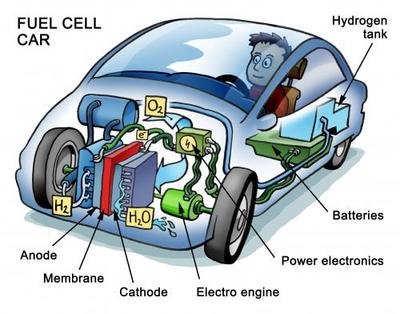China's New Policy, Adoption of 1 Million Fuel Cell Electric Vehicles In 10 Years - Oh Baby
SEE ALSO: China's "Father of Electric Cars" Disowns First Child Before Maturity, Now Says Hydrogen Is the Future of Automobiles +VIDEO
VANCOUVER, BC, Sept. 21, 2020 - Ballard Power Systems today noted that China's government has announced a new official policy regarding Fuel Cell Electric Vehicles, or FCEVs, which is expected to support the adoption of FCEVs in selected demonstration regions in China. "With a target to achieve 1 million Fuel Cell Electric Vehicles on China's roads by 2030, this new fuel cell policy sets a framework for the scaled adoption of FCEVs," said Randy MacEwen, Ballard President and CEO. "We believe this new policy signifies the strategic importance China places on FCEVs both from a decarbonization perspective as well as a competitive industrial perspective. The new policy comes just as the Weichai-Ballard joint venture has been recently commissioned in Shandong Province with annual manufacturing capacity in excess of 1 Gigawatt of fuel cell stacks. We believe the Weichai-Ballard joint venture is well positioned to become a leading fuel cell stack and module platform in China – the world's largest market for commercial trucks and buses." Mr. MacEwen continued, "We are increasingly transitioning to a carbon-regulated world. With 66 countries announcing net zero carbon targets for 2050, there are now about 20 countries – collectively representing approximately 70% of global GDP – that have announced hydrogen strategies or roadmaps as key planks of their decarbonization plans. As part of this movement policymakers and industry are prioritizing the decarbonization of medium- and heavy-duty motive applications, including bus, truck, rail and marine. Fuel cell technology offers a zero-emission technology pathway for these hard-to-abate mobility use cases that feature heavy payload and have requirements for long range and fast refueling. We are pleased to see China's priority on stimulating the adoption of zero-emission commercial vehicles, including buses and trucks, using fuel cell technology. We are also pleased that the policy framework is set for the next four years." Ballard's technology enjoys significant share of the approximately 7,200 FCEVs deployed in China to date. Ballard has been executing an aggressive market strategy since closing a strategic collaboration agreement with Weichai Power Co., Ltd. ("Weichai; https://en.weichaipower.com/) in November 2018, which included the establishment of a joint venture – owned 51% by Weichai and 49% by Ballard – for the production and assembly of Ballard's next-generation fuel cell stacks and modules for use in China's bus, truck and forklift markets. Weichai also made an equity investment in Ballard, taking a 19.9% ownership position at that time. The joint venture is located in a newly constructed Weichai facility with approximately 225,000 square feet and has a staff of approximately 180 employees. Ballard will provide more context on the new policy at its upcoming Investor and Analyst Day 2020 on September 29, 2020, with further details available here. About Ballard Power Systems SHUNSUKE TABETA BEIJING -- The Chinese government said Monday it will roll out subsidies to companies developing core fuel cell technology in a bid to boost the country's competitive advantage in producing the hydrogen-propelled autos. The new program will replace existing purchase assistance and is slated to last for four years. The central government will select development proposals submitted by local governments, which will use the subsidies to fund FCV technology developers in their areas. The Ministry of Industry and Information Technology and the Ministry of Finance, sent notice of the subsidy to local authorities. Chinese manufacturers of electric vehicles are facing fierce competition from foreign rivals. By positioning FCVs as a strategic next-generation automobile on par with electric-powered cars, Beijing aims to take the lead in the global development race. The new program is expected to be a boon for Toyota Motor. The Japanese automaker owns a 65% stake in a Chinese joint venture that develops fuel cell systems with local partners. China's new energy vehicle field is open to foreign capital, and the subsidy program contains no language specifically excluding foreign-owned entities. China introduced purchasing subsidies for electric vehicles in 2009. Resulting sales increases helped automakers boost development of the vehicles. Now China is the world's largest market for electric vehicles, with roughly 1 million units sold annually. On the other hand, only about 7,000 fuel cell vehicles have been sold in China due to the complexity of developing the technology. To address this, the government decided to directly subsidize the development of the technology. The incentives will encourage the development of core components, such as electrodes and fuel cell stacks, to establish a supply chain. The program will prioritize buses and other commercial vehicles. In submitting applications, local governments are expected to provide such information as the track record of participating companies, as well as their research plans and the situation regarding the supply chain. The government will accept applications through mid-November. Possible candidate regions include the capital economic zone in Hebei Province encompassing Beijing and Tianjin, as well as the Yangtze Delta centered around Shanghai. The Pearl River Delta surrounding Guangdong Province and the urban strip containing the cities of Chengdu and Chongqing are also contenders.
Ballard Power Systems' vision is to deliver fuel cell power for a sustainable planet. Ballard zero-emission PEM fuel cells are enabling electrification of mobility, including buses, commercial trucks, trains, marine vessels, passenger cars, forklift trucks and UAVs. To learn more about Ballard, please visit www.ballard.com.
Nikkei staff writer
September 21, 2020;



